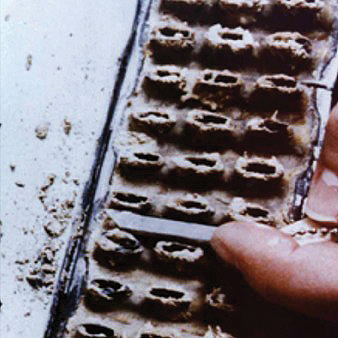Scale Formation
A diesel engine generates enough heat to warm a seven-room house during the winter. It must shed

some of this heat to operate efficiently and prevent severe engine component damage
Two-thirds of this heat is lost through the exhaust and through the engine work. The remaining third must be pulled from an engine by the cooling system.
It is critical that all cooling system heat exchange surfaces remain clean. Hard water scale can block a cooling system’s ability to transfer heat resulting in overheating. Only 1/16 in. of scale will reduce cooling system heat transfer efficiency by 40%!
Calcium and Magnesium
Most cooling system water contains calcium and/or magnesium from drinking water supplies. Water that contains over 100 ppm of these minerals is considered “hard water”. It is wonderful to drink, but these minerals can form scale in engine cooling systems. As the concentration of these minerals increases, so does the probability that you will have cooling system scale problems. The level of dissolved solids in coolant water is generally referred to as the “total hardness” reported in parts per million (ppm). Cooling system additives that contain anti-scale chemicals can allow the use of moderately hard water. It is best to use water that is at least as good as the recommended water quality listed in the ASTM standards.
How Scale Forms
The potential for scale formation on hot metal cooling system surfaces is affected by a number of dynamic conditions. Some of the mechanisms and parameters that affect the formation of these deposits:
Water hardness – the harder the water being used in an engine coolant, the greater the amount of scale formation.
Temperature – as coolant temperatures increase, hardness salts (calcium and magnesium) in solution become less soluble and increase their propensity to plate out on hot metal cooling system surfaces
Flow characteristics – scale generally forms on the hot side of a cooling system and in areas of low or turbulent flow.
Entrapped air – any air bubble formation in a coolant area (bubbling around a hot source) increases the tendency for scale to form in that area.
pH – increases in pH will increase the potential for scale deposits. Damage to water pump seals.
Calcium and magnesium have the tendency to combine with the phosphates found in old-fashioned antifreeze and some additive packages. They form calcium and magnesium phosphate scale on heat transfer surfaces, especially on water pump seal faces. These deposits can destroy the flatness of a seal face, preventing the water pump seal from sealing. The result can be destruction of the water pump bearings.
Cooling system problems that result from overheating caused by scale:
- Cracked heads and warped engine blocks.
- Oil temperature running abnormally high.
- Failure of the cooling system fan to turn on.
- Scale deposits on cooling system block heaters
Controlling scale deposits in an engine cooling system
Scale removal: Before a treatment is selected, a cooling system should be cleaned of all existing contaminants and hard water scale deposits.
In-service cleaner: Penray developed Penray 2001 treatment for on-line cooling system cleaning. This allows for cleaning of harmful mineral scale, rust and corrosion deposits from cooling system metal surfaces while the engine is in operation. 2001 cleaner is an inhibited cleaner. It contains a well-balanced corrosion inhibitor package that provides total metal corrosion protection while it cleans.
RTO Cleaner: Penray developed the 200264 (RTO). The product is specialized to remove oil, hydraulic and transmission fluids from the cooling system. In addition, the product will remove dropout, silicate gel, scale buildup, and other deposits. RTO is safe on seals and metals and safe for use on all coolant formulations.
Clean your system when any of the following occurs:
- When you notice water pump leaks (leaking around the weephole)
- When your cooling system fan isn’t turning on properly
- When the cab or bunk heater isn’t getting any heat during winter months
- When oil temperatures are running hot
- When thermostats start sticking
Before changing the coolant
Preventing engine scale:
After cleaning your cooling system, select a corrosion inhibitor that contains a good scale inhibitor. Pencool 3000 cooling system treatment contains antiscale. Penray has thoroughly tested its scale inhibitor against numerous competitive cooling system inhibitors for anti-scale effectiveness.
Summary:
Scale build up is serious and can destroy an engine. Intelligent preventative maintenance practices, including the proper use of Penray products such as Pencool and Penray cleaners, will prevent scale from forming. Pre-existing scale can be removed, restoring optimum engine cooling.
Scale build up is serious and can destroy an engine. Intelligent preventative maintenance practices, including the proper use of Penray products such as Pencool and Penray cleaners, will prevent scale from forming. Pre-existing scale can be removed, restoring optimum engine cooling.
| Total Solids | Total Hardness | Chloride Sulfate | 340 ppm max | 170 ppm max | 40 ppm max | 100 ppm max |
|---|---|---|---|---|---|---|
| pH | – | – | 5.5-9.0 | – | – | – |
